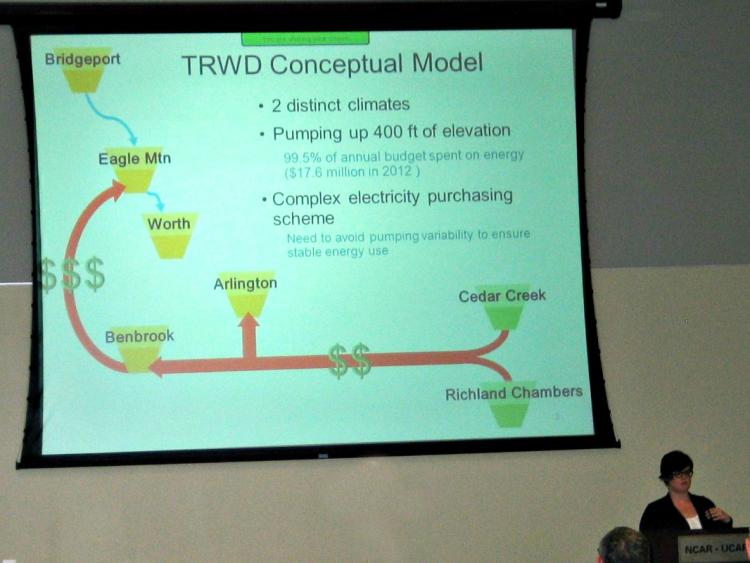 Funding Agency
Funding Agency
Tarrant Regional Water District
Research Team
- Rebecca Smith, MS thesis
- Joseph Kasprzyk, principal investigator
- Laura Blaylock, Tarrant Regional Water District
- John Carron, Nick Mander, Hydros Consulting
- Edie Zagona, Bill Oakley and Neil Wilson, CADSWES
Past research has proven the utility of using multiobjective evolutionary algorithms (MOEAs) to optimize complex water management problems with many conflicting performance objectives. This study expands on the multiobjective optimization methodology by embedding a sophisticated RiverWare model in the algorithm search loop. The main challenges beyond linking the algorithm and model were due to the model’s long simulation time and complexity. Addressing the simulation time necessitated several creative approaches to ensure efficient but thorough algorithm search and intelligent representation of hydrologic variability. Successfully addressing these issues confirms that advanced detailed operations models for civil infrastructure and water management can be used in MOEA-based multiobjective optimization.
The complexity of the Tarrant Regional Water District (TRWD) model offered additional challenges through which this study was able to gain further insight into the MOEA-assisted multiobjective optimization methodology. Initial objectives focused on system-wide reduction in pumping. Through the failure of the initial objectives to account for the performance of individual reservoirs, this study recognized that conflicts exist between objectives not only at a subsystem scale but also between system components and the broader system-wide objectives. Additionally, the incorporation of this information into a second problem formulation, which provided further system insights, confirmed that iterative problem definition is crucial to the decision-making process.
The results obtained with this complex model suggest the need for further refinement of problem formulation, but also provided valuable information to TRWD. The implications of climate forecasting and initial conditions within their model have a significant impact on the performance of suggested management alternatives and may contribute to ambiguity in the relationships between the decisions made to balance and supplement reservoirs and the performance outcomes. This knowledge may inform TRWD’s approach to optimization and decision making in the future and proves the value of the intermediate outcomes in multiobjective optimization. Rebecca presented this work at the 2015 RiverWare User Group meeting.
This work is published in Rebecca Smith's MS thesis (2014), available from the Publications page, and R. Smith, J. Kasprzyk, and E. Zagona (2015), “Many-Objective Analysis to Optimize Pumping and Releases in Multireservoir Water Supply Network,” Journal of Water Resources Planning and Management, 04015049-1—04015049-14, DOI 10.1061/(ASCE)WR.1943-5452.0000576.
